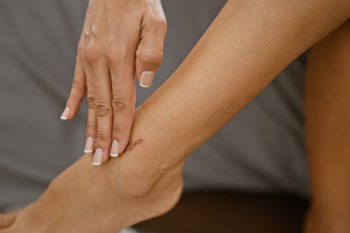
Some foot wounds do not heal as expected and may linger for weeks or even months. These are considered chronic and can result from poor circulation, diabetes, nerve damage, or repeated pressure on one area. Often, they begin as small cuts, blisters, or sores that fail to close and may become red, swollen, or develop drainage. Left untreated, chronic wounds can lead to infection and more serious complications. This is especially concerning for individuals with diabetes or reduced sensation in the feet, who may not feel the injury worsening. Proper wound care, offloading pressure, and treating any underlying conditions are key to recovery. In many cases, advanced therapies or podiatrists are needed to encourage healing. If you have a foot wound that has not improved within two weeks or seems to be getting worse, it is suggested that you see a podiatrist for a full evaluation and appropriate treatment.
Wound care is an important part in dealing with diabetes. If you have diabetes and a foot wound or would like more information about wound care for diabetics, consult with Philip C. Caswell, DPM from Family Foot & Ankle Care. Our doctor will assess your condition and provide you with quality foot and ankle treatment.
What Is Wound Care?
Wound care is the practice of taking proper care of a wound. This can range from the smallest to the largest of wounds. While everyone can benefit from proper wound care, it is much more important for diabetics. Diabetics often suffer from poor blood circulation which causes wounds to heal much slower than they would in a non-diabetic.
What Is the Importance of Wound Care?
While it may not seem apparent with small ulcers on the foot, for diabetics, any size ulcer can become infected. Diabetics often also suffer from neuropathy, or nerve loss. This means they might not even feel when they have an ulcer on their foot. If the wound becomes severely infected, amputation may be necessary. Therefore, it is of the upmost importance to properly care for any and all foot wounds.
How to Care for Wounds
The best way to care for foot wounds is to prevent them. For diabetics, this means daily inspections of the feet for any signs of abnormalities or ulcers. It is also recommended to see a podiatrist several times a year for a foot inspection. If you do have an ulcer, run the wound under water to clear dirt from the wound; then apply antibiotic ointment to the wound and cover with a bandage. Bandages should be changed daily and keeping pressure off the wound is smart. It is advised to see a podiatrist, who can keep an eye on it.
If you have any questions please contact our office located in Sparta, NJ . We offer the newest diagnostic and treatment technologies for all your foot and ankle needs.
